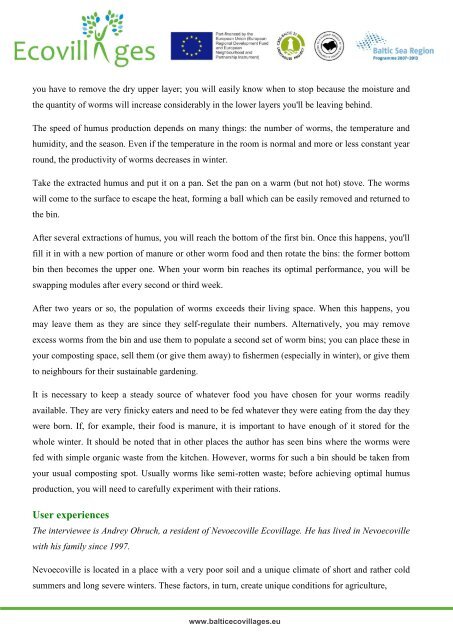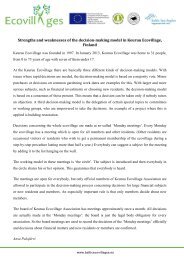Production of humus with vermicompost - Ecovillages
Production of humus with vermicompost - Ecovillages
Production of humus with vermicompost - Ecovillages
You also want an ePaper? Increase the reach of your titles
YUMPU automatically turns print PDFs into web optimized ePapers that Google loves.
you have to remove the dry upper layer; you will easily know when to stop because the moisture and<br />
the quantity <strong>of</strong> worms will increase considerably in the lower layers you'll be leaving behind.<br />
The speed <strong>of</strong> <strong>humus</strong> production depends on many things: the number <strong>of</strong> worms, the temperature and<br />
humidity, and the season. Even if the temperature in the room is normal and more or less constant year<br />
round, the productivity <strong>of</strong> worms decreases in winter.<br />
Take the extracted <strong>humus</strong> and put it on a pan. Set the pan on a warm (but not hot) stove. The worms<br />
will come to the surface to escape the heat, forming a ball which can be easily removed and returned to<br />
the bin.<br />
After several extractions <strong>of</strong> <strong>humus</strong>, you will reach the bottom <strong>of</strong> the first bin. Once this happens, you'll<br />
fill it in <strong>with</strong> a new portion <strong>of</strong> manure or other worm food and then rotate the bins: the former bottom<br />
bin then becomes the upper one. When your worm bin reaches its optimal performance, you will be<br />
swapping modules after every second or third week.<br />
After two years or so, the population <strong>of</strong> worms exceeds their living space. When this happens, you<br />
may leave them as they are since they self-regulate their numbers. Alternatively, you may remove<br />
excess worms from the bin and use them to populate a second set <strong>of</strong> worm bins; you can place these in<br />
your composting space, sell them (or give them away) to fishermen (especially in winter), or give them<br />
to neighbours for their sustainable gardening.<br />
It is necessary to keep a steady source <strong>of</strong> whatever food you have chosen for your worms readily<br />
available. They are very finicky eaters and need to be fed whatever they were eating from the day they<br />
were born. If, for example, their food is manure, it is important to have enough <strong>of</strong> it stored for the<br />
whole winter. It should be noted that in other places the author has seen bins where the worms were<br />
fed <strong>with</strong> simple organic waste from the kitchen. However, worms for such a bin should be taken from<br />
your usual composting spot. Usually worms like semi-rotten waste; before achieving optimal <strong>humus</strong><br />
production, you will need to carefully experiment <strong>with</strong> their rations.<br />
User experiences<br />
The interviewee is Andrey Obruch, a resident <strong>of</strong> Nevoecoville Ecovillage. He has lived in Nevoecoville<br />
<strong>with</strong> his family since 1997.<br />
Nevoecoville is located in a place <strong>with</strong> a very poor soil and a unique climate <strong>of</strong> short and rather cold<br />
summers and long severe winters. These factors, in turn, create unique conditions for agriculture,<br />
www.balticecovillages.eu



